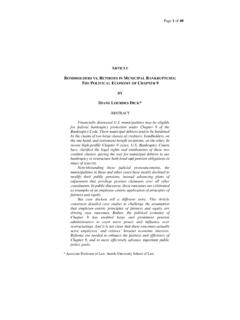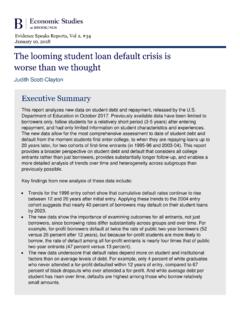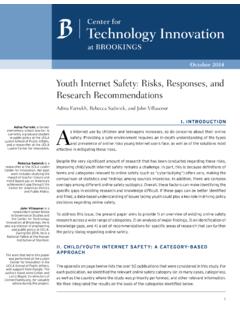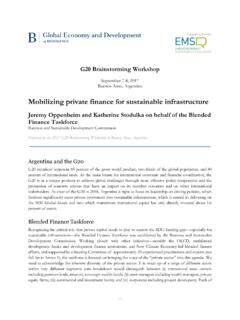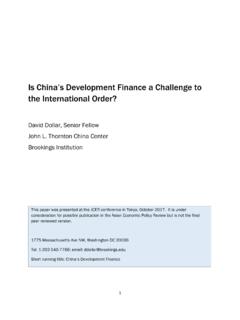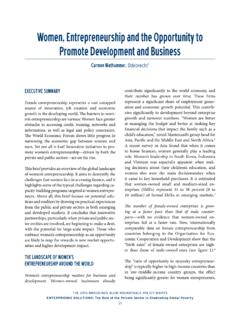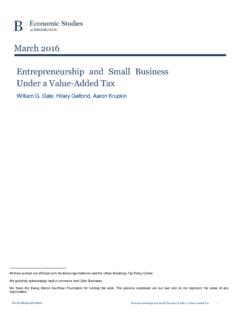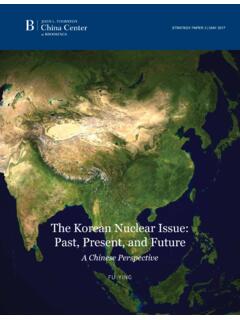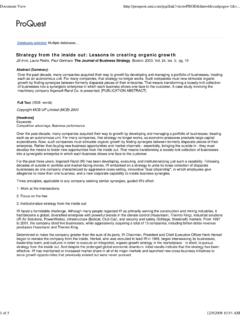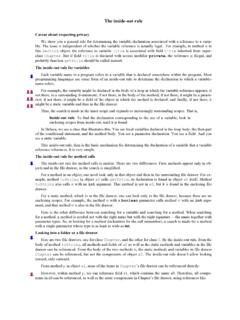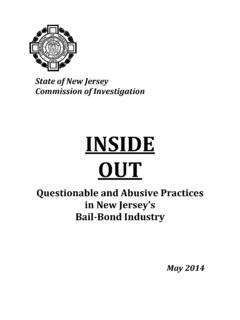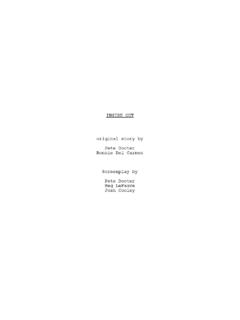Transcription of Inside out: The challenge of prison-based criminal ...
1 BROOKINGSL ocal Orders Paper Series PAPER 3 | September 2016 Inside Out: The challenge of prison - based criminal Organizations BENJAMIN LESSINGL ocal Orders Paper SeriesACKNOWLEDGEMENTSThis paper is part of the Brookings seminar, Reconstituting Local Orders. The seminar is directed by Brookings Senior Fellows Vanda Felbab-Brown, Shadi Hamid, and Harold Trinkunas, who are grateful to the Foreign Policy Director s Special Initiative Fund for its recognizes that the value it provides to any support-er is in its absolute commitment to quality, independence, and im-pact. Activities supported by its donors reflect this commitment, and the analysis and recommendations of the Institution s scholars are not determined by any THE RECONSTITUTING LOCAL ORDERS PROJECTLed by Brookings Senior Fellows Vanda Felbab-Brown, Shadi Hamid, and Harold Trinkunas, the Brookings Seminar on Reconstituting Local Orders seeks to better understand how do-mestic political order breaks down and is reconstituted.
2 It draws out policy implications and recommends more effective action for local governments and the international community. It examines these issues by bringing together top-level experts and present disorder in the international system is significantly augmented by the break-down of domestic order across a number of key states. Around the globe, the politics of iden-tity, ideology and religion are producing highly polarized societies and deepening conflicts among non-state actors and between non-state actors and the state. In the Middle East, the Arab Spring disrupted long calcified political systems in ways that are still producing unpre-dictable effects on the regional order. The collapse of political order in Libya has wide-rang-ing consequences for governance across the Sahel, intensifying Mali and Nigeria s fragility and highlighting the many deficiencies of their states.
3 Meanwhile, Russia s annexation of Crimea was facilitated by a breakdown of political order in Ukraine, and Russia s aggres-sive external posture also partially reflects and compensates for its internal weaknesses. But even emerging powers such as India and Brazil face profound and persistent governance problems, including in public safety and the rule of law. Among the topics explored in the Seminar are the construction of institutions and counter-institutions in the Middle East and South Asia; the role of external interveners and local militias in conflict settings; and forms of governance in slums and prisons, such as by criminal Seminar is a collaborative research space that serves as a launching pad for cutting edge debate and research around questions of local and transnational order.
4 The core of the an-alytical and policy-prescriptive exploration focuses on how political and social orders are reconstituted, the resulting impact on regional order and the international system, and what roles the international community should play. Among the products of the Seminar are ana-lytical and policy papers as well as shorter articles and blog posts that examine cross-regional comparisons and identify policy implications and Out: The challenge of prison - based criminal OrganizationsBENJAMIN LESSING1 Local Orders Paper SeriesIntroductionContemporary prison gangs present new and confounding challenges for states. In Central America and Brazil and even in the prison gangs have evolved from small predatory groups to sophisticated criminal organizations with the capacity to organize street-level crime, radically alter patterns of criminal violence, and, in the extreme, hold gov-ernments hostage to debilitating, orchestrated violence and disruption.
5 Unlike traditional armed groups though, prison gangs cannot be directly neutralized through repressive force, since most of their leadership is al-ready incarcerated. Indeed, common hardline state responses like aggres-sive policing, anti-gang sweeps, and enhanced sentencing can inadvertently swell prison gangs ranks and strengthen their ability to coordinate activity on the street. Breaking up prison -gang leadership has proved particularly counterproductive, often facilitating prison gangs propagation throughout state-and national-level prison systems. Alternative approaches like gang truces that exploit prison gangs capacity to organize and pacify criminal markets and indeed whole peripheral regions can be very effective at re-ducing violence.
6 However, they are politically dicey (and hence unstable), and ultimately leave the state partially dependent on prison gangs for the provision of order, both within and beyond the prison , there is no silver bullet. Indeed, there are three distinct problems for policy-makers to grapple with. First, as the research dis-cussed here shows, many typical responses have unintended and deeply Local Orders Paper SeriesInside Out: The challenge of prison - based criminal Organizations Local Orders Paper Series2counterproductive consequences. In particular, anti-gang crackdowns, which often raise incarceration rates, lengthen sentences, and worsen pris-on conditions, can actually help prison gangs establish authority outside prison , organize criminal markets, and orchestrate mass violence and pro-test.
7 In many cases, prison gangs come to play a major role in providing order in peripheral communities, imposing codes of conduct that signifi-cantly reduce property crime and violence among , while there is evidence that these mass-incarceration policies helped prison gangs establish their authority, both within prison and on the street, it is not clear that simply reducing incarceration rates or improving prison conditions would neutralize that authority. The social orders that prison gangs have built in Central America, Brazil, and even parts of the , rest on real institutions of varying degrees of formality: from shared language and symbols to written constitutions, and even corporate and state-like administrative structures.
8 Like all institutions, these are likely to be sticky, resilient to turnover in members and leaders, and adaptable to changing local , it is not clear that rolling back, undermining, or neutralizing gang authority even if it were possible would produce positive outcomes. States were not good at providing order in prisons or peripheral areas be-fore sophisticated prison gangs arose, and there is little reason to believe that they can entirely supplant gang authority in the short or even medium term. Smashing the authority of prison gangs could lead to outbreaks of brutal infighting or a chaotic scramble for power. As such, this paper recommends a containment approach that strikes a balance between hardline repression and accommodation.
9 Policymakers should aim to: increasingly acknowledge gang presence and power, rather than deny or obfuscate it; set rules of the game that take advantage of gang leaders ability to pacify criminal markets while demarcating realms where the state can slowly supplant gangs; use repression more strategically to Many typical responses have unintended and deeply counterproductive consequences. 1 John M. Hagedorn, The Global Impact of Gangs, Journal of Contemporary criminal Justice 21, 2 (2005) 153 169. Hagedorn defines institutionalized gang as one that persists despite changes in leadership ( , killed, incarcerated, or matured out ), has organization complex enough to sustain multiple roles of its members (including roles for women and children), can adapt to changing environments without dissolving ( , as a result of police repression), fulfills some needs of its community (economic, security, services), and organizes a distinct outlook of its members (rituals, symbols, and rules).
10 Local Orders Paper SeriesInside Out: The challenge of prison - based criminal Organizations Local Orders Paper Series3enforce these rules, creating incentives for gang leaders to avoid violence and anti-social behavior; and put greater state, civil-society, and interna-tional resources into recuperating state authority in non- criminal areas where gangs currently hold paper begins with background on contemporary prison gangs, which we might more accurately refer to as prison - based criminal organizations. I then present findings of research into the link between state law-enforce-ment and carceral policies and prison gangs capacity to project their pow-er onto the street in three leading cases: California; El Salvador; and S o Paulo, Brazil.
